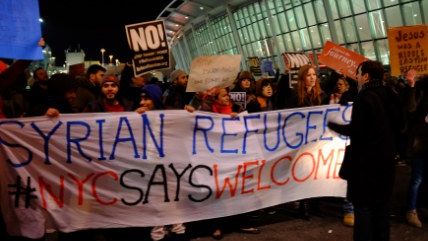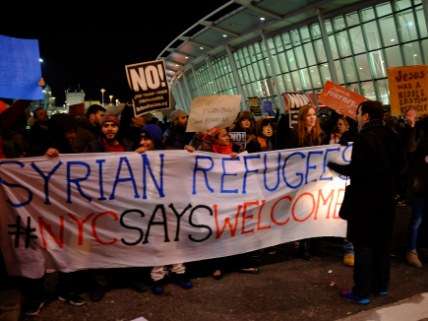How the Travel Ban Helps Terrorists
America offers ISIS a useful propaganda recruitment tool.


If you're afraid that terrorists from a particular country will come to kill your citizens, it makes sense to ban anyone from that place. So brace yourselves, Americans. Any day now, the Syrian government may impose a complete and total shutdown on travelers from the United States.
Donald Trump thinks there is a pipeline of violent extremists from Syria and other predominantly Muslim countries. He's right, but he's wrong about the direction of the flow. Islamic State recruits aren't coming from Syria to the United States. They are going from the United States to Syria.
Nora Ellingsen, who spent five years working on international counterterrorism investigations at the FBI, went through all the cases she could find over the past two years. Over that time, the agency "has arrested 34 Americans who aspired to leave, attempted to leave or actually left the United States to join a terrorist group overseas," she writes—compared with two refugees it has arrested from the seven countries included in Trump's travel ban.
A report from Congress found that 250 U.S. nationals have gone to Syria or Iraq to fight for the Islamic State group, also known as ISIL and ISIS. "More Americans have snuck into Syria to join ISIL," she writes on the Lawfare blog, "than ISIL members have snuck into the United States."
In ruling against the president's executive order, a panel of three judges for the 9th U.S. Circuit Court of Appeals couldn't help noticing that "the government has pointed to no evidence that any alien from any of the countries named in the order has perpetrated a terrorist attack in the United States." Now we know why.
The Trump administration portrays itself as the Dutch boy with his finger in the dike, trying to block a flood of militants disguised as Syrian kindergarteners. John Kelly, secretary of homeland security, explained the abruptness of the travel ban: "The thinking was to get it out quick so that potentially, people that might be coming here to harm us would not take advantage of some period of time that they could jump on an airplane."
Even before the ban, though, Syrians couldn't just claim to be refugees and proceed to the airport. They had to spend 18 to 24 months being screened and processed. It's not an option for someone in a hurry.
Kelly also left out the large, honking fact that the danger Americans face is less from without than from within. That's clear from a new study done by the Chicago Project on Security and Threats at the University of Chicago.
"The American Face of ISIS" examines 112 cases of people known to have been involved in "ISIS-related offenses"—including carrying out attacks, plotting them, traveling to take part in them or helping other confederates. It reports that 83 percent are U.S. citizens, with 65 percent born here. None came as a refugee from Syria.
Only three of the 112 were refugees, two from Bosnia and one from Iraq. CPOST Director Robert Pape said the researchers found "no evidence of ISIS smuggling in fighters into the United States alongside with refugees."
Sniffing out incoming terrorists among those arriving from these nations is like scouting for future NHL stars in Jamaica. In the past two years, Ellingsen says, the FBI has arrested more Americans plotting violent attacks on Muslims in the U.S. than it has refugees from all the banned countries combined.
Skittish sorts may figure it's better to be safe than sorry. But the travel ban doesn't enhance our safety even marginally. Just the opposite.
Middle Eastern terrorists figured out long ago it was too hard to get their people into this country. What is easy is transmitting propaganda. As Pape points out, "ISIS terrorists in America are walk-in volunteers"—people living in the U.S. who have been radicalized by its online videos.
What the travel ban does, by singling out Muslims in these seven countries, is to buttress the Islamic State claim that the West is at war with Islam. If the policy induces a small percentage of American Muslims—who number 3.3 million—to embrace the group, the risk of terrorism will multiply.
Trump thinks he can protect the nation by blocking the arrival of foreigners with murderous plans. The bigger danger is that the Islamic State will enlist more Americans in its bloody cause. And Trump may be the best recruiter it has ever had.
© Copyright 2017 by Creators Syndicate Inc.


Show Comments (137)